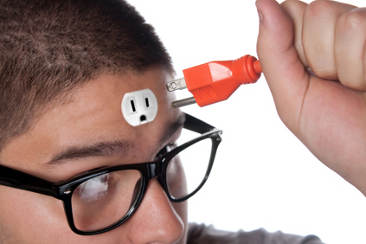
The third National Day of Unplugging, begins at sundown today (Friday).
We’re overdoing it with our go-to gizmos, unpluggers argue. We’ve become distracted, unavailable, oblivious, twitchy, obsessive, needy and, in some ways, insufferable. We need, they say, to give it a rest.
The National Day of Unplugging was started by a New York-based nonprofit called Reboot, which is working to reinvent Jewish traditions and culture in ways that resonate for a new generation of Jews and others. The unplugging idea appears to be gaining traction, says Tanya Schevitz, Reboot’s San Francisco-based national communications manager. She cites the increase in Web traffic to sites promoting it. (Web traffic before and after the national day of digital detox, not during).
And she’s right. But can you do it? Can you unplug for 24 hours? And no, not just because the NCAA’s Sweet 16 will play out this weekend — prime time for tweeting, score-checking and the occasiona lFacebook smack-talk. OK, maybe that’s part of it.
Lecturer and author Lawrence Lessig, who once a year moves off the grid for a month will be joining in. And globe-trotting CEO Yaacov Cohen, who weekly observes the Jewish sabbath, including abstaining from technology. And the guys at Stanford, whose study indicates that middle-school girls develop better social relationships when they actually talk to, and don’t just text, the people in their lives. And Sherry Turkle, the MIT professor who literally wrote the book on digital dependency.
Anne Wojcicki is a prominent Silicon Valley CEO, running an online DNA-testing company, and she is unplugging. She’s married to Sergey Brin, a guy who started a business that relies on users being plugged in as much as possible. And not only can Wojcicki unplug, she embraces it and recommends it.
“We both appreciate moderation,” she says of herself and Brin. “I think we’re pretty intense. We really enjoy what we do, and we obviously enjoy being online, but there are other things. It’s really nice to be with our family. It’s nice to unplug.”
There are other things. Which is the point. But there are times when it seems like there aren’t other things. Times when it seems the only thing is to respond to emails and calls that are coming in fast and furious on the computers in our pockets. Times when it seems we’ve been granted a magic moment of free time, so why not use it to tweet our dinner plans or scan Facebook or check-in on Foursquare, so others with free moments and computers in their pockets can pull them out and follow our every move?
Wojcicki, who’s on the Reboot board, says Silicon Valley is the perfect place for a day of digital cleansing to take hold — exactly because of the region’s tech obsession. “I think it’s actually easier here, because people are so plugged in that it’s nice to have real contact,” she says.
No, Wojcicki can’t just check out, digitally speaking, for a week at a time. But she does look for some time each day when she is unencumbered by digital distractions, particularly when she is with her two young children. “When you’re unplugged,” she says, “your senses are so much more in tune to the things in front of you.”
Many have argued, and studies have shown, that being in tune with your surroundings, especially when you are surrounded by people who love you, is vital to building the relationships that humans need.
Turkle, who wrote “Alone Together: Why We Expect More From Technology and Less From Each Other,” says efforts like the National Day of Unplugging could well be a sign that we are coming to our collective senses.
“It’s kind of a symbol,” Turkle says, “that a lot of people have come to a moment when it just seems like it’s time to take a pause and reflect.”